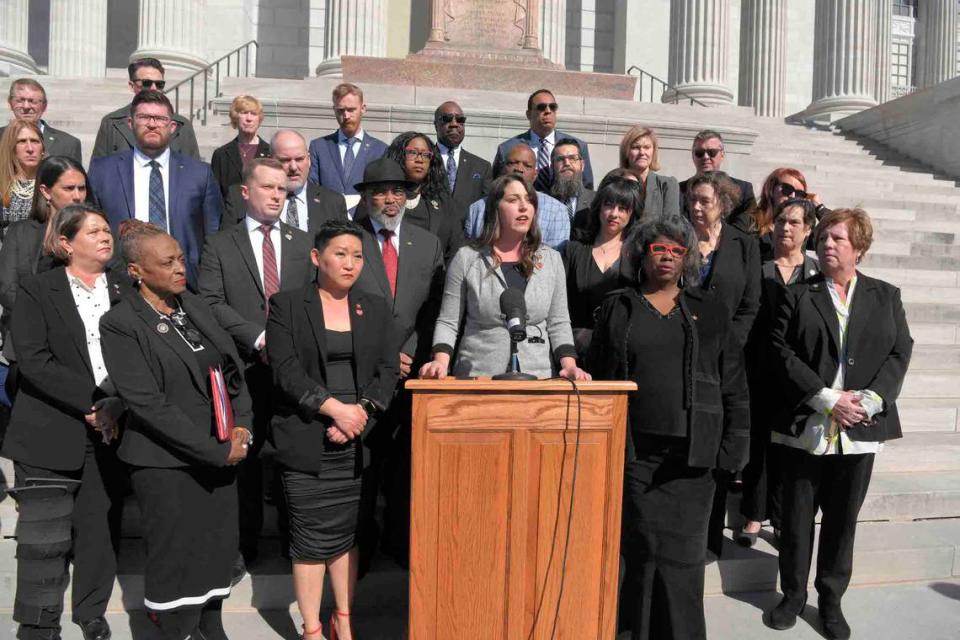Does Missouri law or Kansas City ordinance prohibit minors from carrying firearms?
Six days after gunfire broke out at the Chiefs’ Super Bowl victory parade, two minors remain in custody on charges related to firearms and resisting arrest.
We don’t know yet exactly how police think the two may be connected to the mass shooting that killed one victim and injured upwards of 38 more, including over 20 people with gunshot wounds. But Kansas City ordinances, Missouri laws and federal regulations around firearm possession can offer a glimpse at the legality of minors carrying guns in public.
Here’s what we know about whether minors can possess firearms in Kansas City under current laws.
What do federal laws say about minors possessing firearms?
Let’s start at the federal level. Federal laws restrict minors from carrying some types of firearms, while others are left up to states’ discretion.
Handguns: Federal law prohibits those under age 18 from possessing handguns or handgun ammunition. There are some exceptions for employment, farm work, hunting, target practice, military service and self defense.
Machine guns: A federal license is required to own a machine gun — and you can’t get a license until you’re 21 or older, said Kansas City lawyer Kevin Jamison, who specializes in firearms law. That means, by definition, that any person under 21 in possession of a machine gun is breaking federal law.
Other types of guns: Jamison confirmed that federal law doesn’t explicitly mention age requirements for the possession of other types of guns, such as shotguns or long guns. While it’s illegal for an adult to give firearms to a minor, the minor themselves is not legally barred from possessing these other types of guns.
What do Missouri’s state laws say about minors carrying firearms?
Missouri places very few restrictions on firearm possession, and takes pains to override all local laws regarding firearms that aren’t explicitly laid out in state law already.
“The general assembly hereby occupies and preempts the entire field of legislation touching in any way firearms, components, ammunition and supplies to the complete exclusion of any order, ordinance or regulation by any political subdivision of this state,” the law reads.
The state bans possession of machine guns, short barreled rifles and shotguns “in violation of federal law.” That means a federal permit is required to own a machine gun, but there are no age restrictions on the other types of firearms.
“A person transferring a gun to a juvenile by sale, gift or loan could be charged with a felony under federal law,” Jamison said. “But it’s not specifically illegal under state law for a juvenile to have a gun.”
The state only places restrictions on firearm possession for people convicted of felonies, “fugitives from justice,” those “habitually” under the influence of drugs or alcohol and those deemed mentally incompetent. Missouri law doesn’t make any mention of age in its restrictions to firearm possession.

What power does Missouri give cities to restrict firearm possession?
The state gives municipalities like Kansas City limited power to restrict firearms at the local level. The one concession it makes is allowing cities to require a state permit from those who carry their firearms openly in public places.
Here’s where it gets a little confusing: Missouri issues concealed-carry permits to those aged 19 and above — or 18 if you’re in the military. While this permit is no longer required to carry concealed weapons anywhere in the state, cities such as Kansas City are allowed to require this permit for those who carry firearms openly.
The state also allows cities to ban so-called “open carry” in certain spaces such as churches, polling places, schools and government offices.
What do Kansas City’s ordinances say about minors carrying firearms?
Kansas City is allowed to require a concealed-carry permit from anyone carrying a firearm openly — effectively limiting so-called “open carry” to those over 19 years old.
But the city doesn’t have the ability to limit the carry of concealed firearms.
Kansas City’s code of municipal ordinances prohibits minors from carrying concealed handguns — but the state supersedes that ban with its wide-reaching preemption of all local firearm related ordinances.
Jamison said that the city could still pursue charges against a minor for breaking that ordinance — but if the state takes charge of prosecution, the city might have to adjust its tactic.
“They can do it until somebody objects,” he said. But if the state preempts the ordinance charge, “they (could) just turn it into a conspiracy for the juvenile to receive the gun, and they save their case.”
Remember: It’s illegal to give a gun to a minor. Jamison believes that if a local prosecutor is willing to “think outside the box” and find the adult who made the gun available to the minor, they could charge the minor as a conspirator to this crime rather than prosecuting them for possessing the gun itself.
Did the Chiefs parade shooters possess their firearms legally?
Two adults face murder charges related to the Union Station shooting, while two minors face charges related to firearms as well as resisting arrest. We don’t know yet what types of firearms the minors possessed, how they got them or whether they fired shots during the commotion.
If the minors were carrying machine guns, Jamison says they were violating federal law by not having a valid permit to do so.
But if other types of guns were involved, state law doesn’t explicitly bar these minors for carrying concealed weapons — and Kansas City doesn’t have the power to enforce stronger restrictions upon them.
Do you have more questions about gun violence in the Kansas City area? Ask the Service Journalism team at kcq@kcstar.com.

